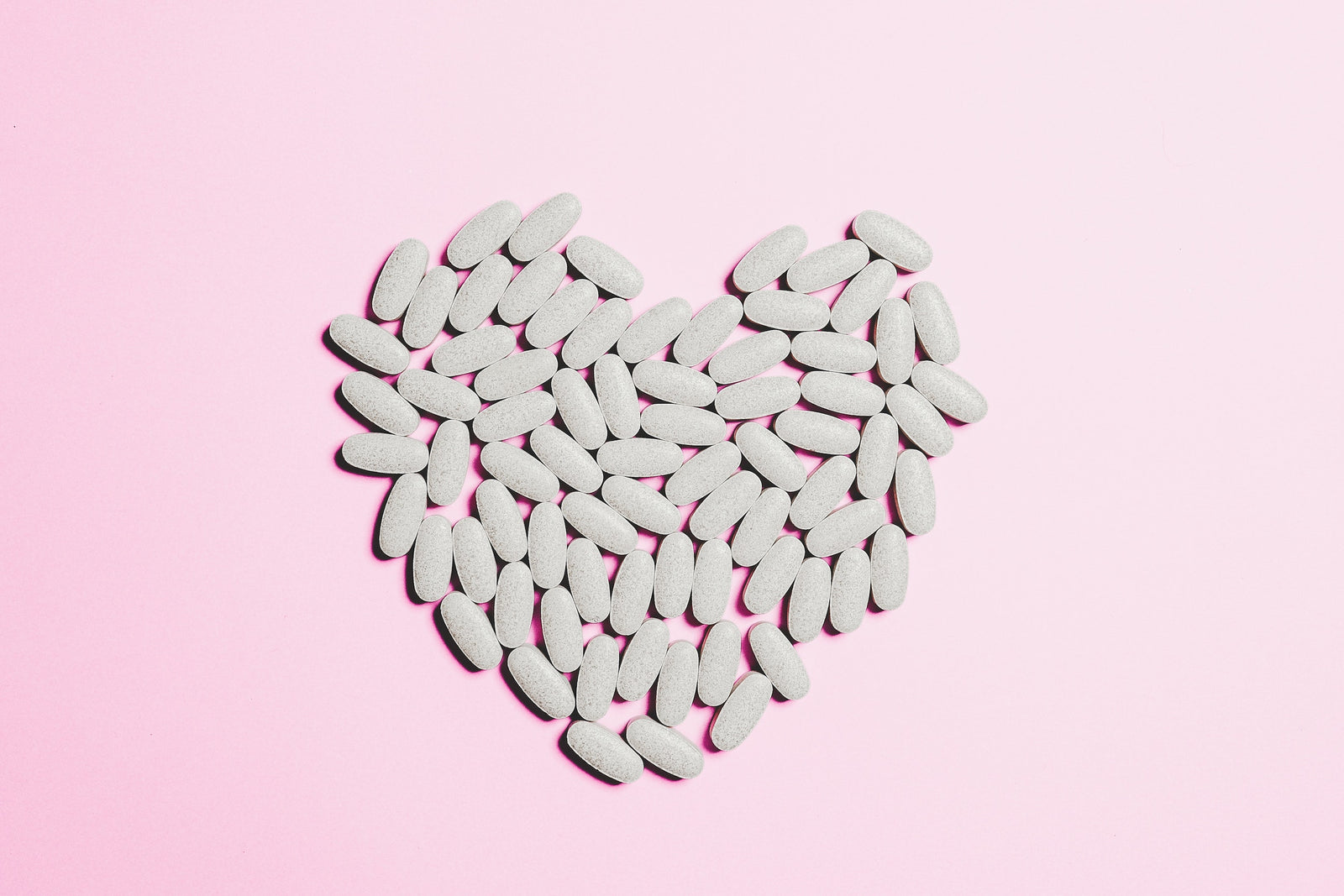Your heart is the main organ of your cardiovascular system, a network of blood vessels that pumps blood throughout your body. Studies have shown that a select few vitamins and supplements may in fact benefit heart health, by reducing blood pressure, controlling cholesterol levels, and improving heart muscle ergogenics. In addition to a healthy diet and exercise, adding a few key vitamins and nutrients, may keep your ticker ticking just a little bit stronger, and maybe a little bit longer. We’re going to discuss the best heart and circulatory health supplements that you need in your diet.
Heart Anatomy And Function
To fully grasp the benefit that supplements may have on your heart health, it is equally as important to understand the anatomy, function, as well as the diseases and conditions that may affect your heart, as you age.
Your heart is the main organ of your cardiovascular system, a network of blood vessels that pumps blood throughout your body. Your heart controls the rhythm and speed of your heart, blood pressure, and works with additional body systems to maintain optimal function.
Your nervous system helps maintain your heart rate by releasing the hormones epinephrine and norepinephrine to accelerate the heart and acetylcholine to slow it down. The endocrine system sends signals through hormones that tell your blood vessels to constrict or relax which affects blood pressure.

Your heart contains four main chambers, made of muscle, and powered by electrical impulses sent via the brain and nervous system. You have two chambers on top (atrium and plural atria) and two chambers on the bottom (ventricles) one on each side of the heart.
The heart also consists of heart valves which open and close to allow blood flow. Blood is pumped through these valves, by three types of blood vessels: arteries, veins, and capillaries.
Heart disease is the leading cause of death worldwide claiming more than 17 million lives each year. The main and most common conditions and disorders that may affect your heart health are
- Atrial fibrillation (Afib): Irregular electrical impulses in your atrium.
- Arrhythmia: A heartbeat that is too fast, too slow or beats with an irregular rhythm.
- Cardiomyopathy: Unusual thickening, enlargement or stiffening of your heart muscle.
- Congestive heart failure: When your heart is too stiff or too weak to properly pump blood throughout your body.
- Coronary artery disease: Plaque buildup that leads to narrow coronary arteries.
- Heart attack (myocardial infarction): A sudden coronary artery blockage that cuts off oxygen to part of your heart muscle.
- Pericarditis: Inflammation in your heart’s lining (pericardium). [R, R].
How Supplements Help Heart Health
Most of the research and clinical evidence supports therapeutic application of specific vitamins and supplements to help control cholesterol. If your cholesterol is too high, it builds up on the walls of your arteries. Over time, this buildup is known as atherosclerosis. This condition causes arteries to become narrowed, and the narrowed blood vessels reduce blood flow to the heart [R, R].
In addition to cholesterol, some supplements may be indicated to aid in blood pressure. High blood pressure can damage your arteries by making them less elastic, which decreases the flow of blood and oxygen to your heart and leads to heart disease. Moreover, decreased blood flow to the heart can cause, chest pain, also called angina.
The lack of dietary supplement regulation by the FDA does raise safety and efficacy concerns for healthcare professionals and consumers alike. Prescription medications and pharmaceuticals prescribed by your physician, may aid in other indications to help treat and or prevent heart disease.
4 Best Heart Health Supplements
To be clear, eating a healthy and nutritious diet full of vitamin and antioxidant rich fruits and vegetables, is the best strategy to increased longevity and overall health, wellness and optimal heart function. Vitamins and supplements are never recommended to treat or prevent cardiovascular disease. However, studies suggest that certain vitamins and minerals can keep your heart healthy. Circulatory and heart health supplements are best used as part of an overall heart protocol and plan which is focused on diet, nutrition, and exercise.
1. Greens+Reds

Greens and reds powders are made with dehydrated fruits and vegetables. Greens ingredients such as wheat grass, spirulina, chlorella, and reds ingredients like pomegranate, beetroot, and turmeric contain powerful plant compounds, known carotenoids and polyphenols, which possess antioxidant and anti-inflammatory properties.
Greens and Reds supplements, are different considering they are derived from real food sources, as compared to other supplements which may be synthesized agents.
GREENS
Numerous greens ingredients have been shown to help reduce cholesterol. For example, a randomized controlled study, published in the Journal of Dietary Supplements, examined the health benefits of wheatgrass supplementation on a group of 59 women. After ten weeks of supplementation with 3.5g of wheatgrass per day, the intervention group experienced a reduction of 5.4% in total cholesterol (TC), 4.4% in low-density lipoprotein cholesterol, and 9.5% in triacylglycerols [R].
Like wheatgrass, several studies have shown that chlorella may reduce cholesterol levels due to its niacin and carotenoid content. A meta-analysis reviewing double-blind randomized controlled trials, conducted at Virginia Common Wealth University found that chlorella supplementation may reduce high blood pressure and lower serum cholesterol levels in patients with hypertension [R].
Another study published in Nutrition Journal administered 5g of chlorella to 63 subjects per day for 6 weeks. the Chlorella group exhibited remarkable changes in total cholesterol and triglycerides, with improved blood lipid levels. Not only that, but “Bad” LDL cholesterol was lowered while “good” HDL cholesterol increased [R].
REDS
Reds ingredients are those indicated by red, yellow, or orange pigment, prodcued from beta-carotene, such as pomegranate and beet root, which are also are rich in nitrates. Nitrates are vasodilators which open and widen blood vessels. They reduce oxygen wasting and increase blood flow to help transport and shuttle vital nutrients to your muscles and vital organs. Studies have shown that this may help to lower blood pressure in individuals with hypertension, a risk factor for heart disease.
Pomegranates for example are affluent in polyphenols, with high antioxidant capacity. Studies have shown that pomegranates have antihypertensive and anti-inflammatory effects. Punicic acid a fatty acid found in pomegranate seed oil, has also been shown to protect against potential heart disease factors [R].
In a study on 51 hyperlipidemic patients, pomegranate seed oil was administered twice a day (800 mg/day) for 4 weeks. There was a significant decrease in triglycerides (TG) and TG: High density lipoprotein (HDL) cholesterol ratio by 2.75 mmol/L and 5.7 mmol/L, respectively, whereas serum cholesterol, LDL-C, and glucose concentration remained unchanged.[R]
Beetroot has also been shown to have profound effects on heart health, by exerting antihypertensive effects. Activation of the sympathetic nervous system caused by increased sympathetic nerve activity, includes elevated heart rate, blood pressure and blood vessel constriction. Sympathetic nerve activity (sympathetic outflow) also increases with some forms of cardiovascular disease, including high blood pressure and heart failure.
A study published in American Journal of Physiology -- Heart and Circulatory Physiology, investigated the effects of nitrate supplementation from beetroot juice on sympathetic nerve activity. Twenty patients, with an average age of 27, participated in a double-blind placebo-controlled study, which administered either beetroot juice, or placebo. The research team recorded the blood pressure, heart rate and muscle sympathetic nerve activity (MSNA) and measured muscle activity at rest. MSNA burst rate, denoting the frequency of nerve activity, was lower when the volunteers drank beetroot juice compared to when they drank the placebo. Sympathetic nerve activity also decreased during exercise. These results provide proof-of-concept that dietary nitrate supplementation can modulate central sympathetic outflow [R].
2. CoQ10

CoQ10 is an antioxidant vitamin-like molecule that facilitates the biological process of generating adenosine triphosphate [ATP] or energy metabolism. ATP powers every single human cellular action that your body performs.
CoQ10 support muscle cells to become more efficient and effective at producing and using energy. More specifically, CoQ10 enables the human body to restore the rate of mitochondrial respiration, muscle strength, and coordination.
CoQ10 promotes healthy heart muscle energetics, cardiac contraction, and blood pressure. The human body’s demand for CoQ10 is greatest within the heart muscle, considering it is the largest muscle in the body. Scientists discovered this fact when they investigated sensitivity of cardiomyocytes to the drug, Adriamycin, which works in the body to prevent CoQ10 from passing electrons efficiently. Results showed the heart’s ability to beat becomes impaired. However, if the human heart contains enough CoQ10, the inhibition of contractions by Adriamycin will be overcome and the heart will continue to beat.
RELATED ARTICLE Why You Should Be Taking A CoQ10 Supplement
3. Omega-3 (Krill Oil)

Omega-3’s are essential polyunsaturated fatty acids (PUFAs). The human body requires both omega-3 and omega-6 fatty acids to survive, however the typical modern-day diet is much higher in Omega-6 fatty acids than Omega-3.
Since they are essential, omega-3s must be obtained through your diet or supplementation. Omega-3 rich foods, are highly prevalent in seafood such as salmon, sardines, tuna, halibut, algae, and krill.
Several studies have shown that PUFAs may reduce the risk of heart disease, fight inflammation, symptoms associated with arthritis, and may have anti-cancer effects. There are three types of omega-3s
- Alpha-linolenic acid (ALA)
- Eicosapentaenoic acid (EPA)
- Docosahexaenoic acid (DHA)
RELATED ARTICLE The Benefits Of Omega-3 Fatty Acids
Krill Oil comes from tiny shrimp-like crustaceans, which are found deep in the cold waters of the Antarctic Ocean. Krill oil is rich in long-chain omega-3 polyunsaturated fatty acids (PUFAs), eicosapentaenoic acid (EPA), and docosahexaenoic acid (DHA), which have been found to have positive effects on inflammation, decreasing oxidative stress, and enhancing recovery [R] Krill also contain a powerfully potent naturally occurring antioxidant called Astaxanthin. Several studies have shown that Astaxanthin has powerful anti-inflammatory properties.
RELATED ARTICLE The Ultimate Guide On Krill Oil, Benefits, Uses, Side Effects
Krill oil and omega-3 fatty acids, have been proven to reduce the chance of cardiovascular disease, stroke and heart attack [R].
A major study published in the New England Journal of Medicine followed 20,551 male doctors for over 17 years. The study showed that the doctors with the highest blood levels of DHA and EPA, the omega 3’s found in krill oil that we’ve previously discussed, had a 90% less chance of dying from a heart attack.
In a double-blind, randomized controlled trial, study participants were administered 12mg of Astaxanthin a day for eight weeks. The results were astounding, as the study showed a 20% decrease in levels of C-reactive protein (CRP), the blood marker for heart disease.
RELATED ARTICLE Astaxanthin Benefits
4. Red Yeast Rice
Red yeast rice is a type of yeast grown on white rice. Read yeast rice supplements, contain a naturally occurring ingredient called monacolin K, which is identical to the active ingredient found in Merck’s pharmaceutical drug lovastatin (Mevacor), which aids in lowering cholesterol.
A meta-analysis published in PLoS One investigated whether red yeast rice was a safe and viable alternative to dyslipidemia - an imbalance of lipids such as cholesterol, low-density lipoprotein cholesterol, (LDL-C), triglycerides, and high-density lipoprotein (HDL). A total of 13 clinical trials were identified, which included 804 patients. Red yeast rice showed a significant lower effect on serum total cholesterol, LDL, and triglyceride levels, suggesting that red yeast rice is an effective and relatively safe approach for dyslipidemia [R]
Heart Health Supplements: Takeaway
The key to healthy aging and longevity, is a combination of diet, exercise, and supplementation, to help optimize and improve overall health and wellness. Your heart is vital for optimal health and without providing essential vitamins, minerals, and nutrients from raw organic whole foods, your health will likely suffer in the long run. Your best bet for a healthy heart, is to eat a nutritious diet, full of fruits and vegetables, healthy fats, and lean proteins. Research indicates that greens, reds, CoQ10, red yeast rice, and omega-3 does combined with a healthy diet and exercise can in fact help improve heart health. Always consult a physician or healthcare provider before adding a new supplement or vitamin to your heart health protocol.
Looking for supplement loaded with anti-inflammatory antioxidants to help you with healthy aging?
SWOLVERINE IS AN ENDURANCE ATHLETE AND ACTIVE LIFESTYLE BRAND. MADE FOR THE ELITE ATHLETE, AND THE STRONG-WILLED OUR PRODUCTS WERE DESIGNED TO FUEL YOUR ATHLETIC PERFORMANCE. WE PERFORM WHEN YOU PERFORM.
We believe that everyone can optimize not only their athletic performance but their human potential. The way we believe we can optimize performance is through transparency, clinically effective doses, and clinically proven ingredients with evidence-based outcomes. We provide the nutrients you need to power your active lifestyle.
References
Karambir Notay, Anthony V. Incognito, Philip J. Millar. Acute beetroot juice supplementation on sympathetic nerve activity: A randomized, double-blind, placebo-controlled proof-of-concept study. American Journal of Physiology - Heart and Circulatory Physiology, 2017; ajpheart.00163.2017 DOI: 10.1152/ajpheart.00163.2017
Li, Yinhua et al. “A meta-analysis of red yeast rice: an effective and relatively safe alternative approach for dyslipidemia.” PloS one vol. 9,6 e98611. 4 Jun. 2014, doi: 10.1371/journal.pone.0098611
Find similar articles:
Supplements












